Text
Liturgy of the Hours is a great form of daily prayer! In fact, it is the primary form of prayer for the Church. I try to do at least a few of the prayers daily. Maybe I'll make a post about it as a guide, if it interests people. Let me know if this is something that would interest any of you!
I think it’s time I take my prayer to the next level and start learning the Liturgy of the Hours.
17 notes
·
View notes
Text
The Light of Men
How do we develop a personal relationship with the person of Christ?
In him was life, and the life was the light of men. And the light shineth in darkness, and the darkness did not comprehend it.
St John 1:4-5 DRB
In Christ is life; in his words, in his actions, in his precious body and blood. At the heart of the Christian faith lies a relationship to the flesh and blood person of Jesus, the living embodiment of God. Yet, this relationship is difficult for us to develop because we can only encounter Him in the pages of the Bible, and under the accidents of bread and wine in the Eucharist. The Gospels, including this one, are relayed to us by those who had the privilege of knowing him in the flesh. And what a privilege it must have been! Despite the risk of death, the Apostles and early disciples proclaimed the revelation of Christ to Jews and Gentiles alike because through Him they had received life. He showed them how to truly live here on earth, and he merited for them and all of us the gift of eternal life through His sacrifice on the cross.
Still, many who had the privilege of knowing Jesus in the flesh could not accept the salvation he freely offered them. They could not accept the gift of life; they could not comprehend the truth, preferring instead to remain in the darkness of the shadow of death. Today nothing has changed. Many cannot accept the salvation Christ freely offers. The only difference is that we who live today extending His invitation have only the memory of Christ and His teachings in Sacred Scripture as well as the Sacred Tradition handed to us by those who knew Him to guide us. Our consolation is His presence in the Eucharist to sustain us. Where then do we turn for the human dimension to this personal relationship with Jesus that we might offer it to others?...
11 notes
·
View notes
Text
Discussion: How do you act as the leaven in your daily lives?
My hope is that this post would facilitate discussion and dialogue so please rb with your own thoughts!
I've been reflecting recently on what it would look like to be the leaven in our daily lives working towards the "sanctification of the world from within". I think this part of Lumen Gentium is echoing what we see from Saints like Josemaría Escrivá in the founding of Opus Dei. However, we also live in a highly secularized world (at least in western culture) that makes it exceedingly difficult to live out this calling.
There's a distinct difference between evangelizing and proselytizing, which Pope Francis spoke on in 2016, and this blog summarizes that fairly well.
The Holy Father is calling Christians, then, to leave behind the works of the flesh, to not attempt to force anyone else to believe as we believe, but rather to become transparent to Jesus Christ in the holiness of our lives and the truth we profess. We are to become light to the nations, salt of the earth, a people set apart, a city on a hill. We are to draw people to us with the power of the Holy Spirit, not any sort of earthly power or force. We are to prepare ourselves to the best of our abilities to be good and faithful witnesses to one who is infinitely better than we are, allowing grace to build on prepared nature.
This is what I thought would make for interesting discussion:
How do you become transparent to Jesus Christ for those around you in your daily lives/day jobs? How do you act as the leaven in the bread or the salt of the earth working towards the sanctification of the world?
4 notes
·
View notes
Text
In the beginning was the Word
In the beginning was the Word, and the Word was with God, and the Word was God. The same was in the beginning with God. All things were made by him: and without him was made nothing that was made. John 1:1-3 DRB
St. John transports us all the way back to the beginning of Genesis to bring the story of Adam to its long awaited closure in Christ. The seeds of our understanding of God's triune nature lay gently within the life-giving soil of these poetic words. Before creation and its countless dramas that would unfold was the Word (Λόγος, - Logos), which was distinct from God the Father, and yet was God.
By these words we are meant to know that Christ was before all else. His existence was not a reaction to deteriorating circumstances, but a necessary precondition for the liturgical procession of creation itself to commence. As God begins speaking things into being in the first chapter of Genesis, we know that Christ too was there.
While the Holy Trinity is indeed mysterious, what is made plain by these opening lines is that Christ was truly sent in the fullness of time (Gal. 4:4). This moment was one of God's choosing that truly could have been made at any point before this since Christ existed before all else.
Our lives are a series of moments, and in the ones that wound us it's hard to trust that this too is part of God's plan. Yet the revelation of Christ came at the exact moment of God's choosing, most intimately shared with only a handful of people, and despite thousands of years between that moment and now, you and countless others have come to hear about it, believe, and be saved by it. You too have come to exist in the fullness of time, so trust in the Lord in those moments "when all other lights go out."
#catholic#catholicism#christianity#gospel of john#lectio divina#exegesis#faith#theology#prayer#a blog for all seasons#christian blog
26 notes
·
View notes
Text
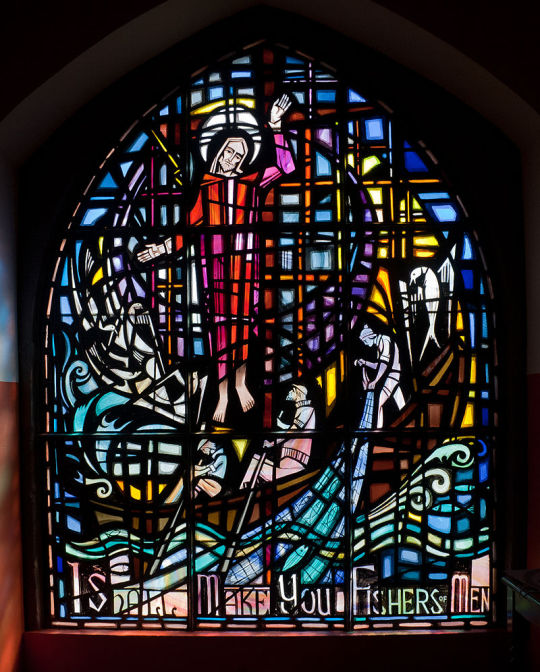
Fishers of Men, a stained glass window in St. Peter's, County Wexford.
Indeed, we, who received the Faith from fishermen, wish also to be understood by fishermen.
- Pope Pius II, Cum bellum hodie (2.4.1), trans. Michael von Cotta-Schönberg. Original Latin below.
Cupimus enim etiam a piscatoribus intelligi, qui fidem a piscatoribus accepimus.
12 notes
·
View notes
Note
It seems like this Lent is already dialing it up to 11 for you. You're doing great @that-catholic-shinobi !

you need to be raped
come off anon and say it then
#catholicism#christianity#catholic#faith#lent#catholic memes#memes#pro life#sanctity of life#pro-life
78 notes
·
View notes
Text
One of the ascetic purposes behind fasting (from food) is to engage in a practice where the body is being conformed to the will of the soul. Think about the conversation Christ has with Nicodemus in chapter three of St. John's Gospel. It's a discourse on life in the Spirit vs life in the flesh.
If fasting from food will bring you back into an unhealthy relationship with food, then it probably would be better to abstain from something else that the body likes for the purpose of spiritual growth/mastery. Alternatively, I've known people from Opus Dei who engage in other types of mortification such as putting a pebble inside their shoe for the whole day (not for Lent, but just in general), sleeping on the floor, etc. Thomas More used to wear a hair shirt. There are many other types of mortification you could practice during this Lent instead of fasting from food that would be equally beneficial spiritually. Hope that helps!
Hope you're having a blessed Ash Wednesday.
Does anyone have recommendations regarding how to properly fast during Ash Wednesday and Lent, for someone who dealt pretty bad with Eating Disorders in the past and is recovered but still fighting poor thoughts and bad behavior at times? 😢
7 notes
·
View notes
Text
Pondering the Nature of Sin During Lent
As I've been preparing myself to enter into the Lenten season, I've been thinking about the nature of original sin, and sin in general. I wanted to use this post to sketch out some ideas for a longer blog post later, but I'd love to get other people's thoughts. So please feel free to comment, or rb with your own thoughts. It helps my writing, and it helps all of us to grow in our faith! Perhaps, this may also provide others who happen upon this post something to wrestle with during Lent.
Original sin is the consequence of the fall of our first parents in Adam and Eve from original holiness in the Garden of Eden (Gen. 3:1-24; CCC 388-390, 399). Losing their trust in God's goodness, they tried to will their own good apart from God. This is the root of all sin even to this day. Yet, they were so close to God. The imagery in Genesis of God walking in the garden in the cool of the day isn't meant to anthropomorphize God, but to demonstrate how highly personal the relationship between Him and Adam and Eve was (Gen. 3:8). Their relationship was like the kind we have with other people in our lives. I suppose it's fitting that the Apostles and disciples likewise enjoyed the privilege of a similarly highly personal relationship with God in the form of Jesus Christ. Our story begins with a personal relationship with God that we forsook, and it ends with a personal relationship with God inviting us back into his friendship.
We inherit original sin from our parents, but what does this actually mean? All of us are born to imperfect people who make mistakes, who themselves were born to imperfect people prone to error. This relationship imprints things onto us, because the relationship with our parents is a highly personal one. Likewise our friends leave traces of themselves embedded in our personalities, and help shape and reinforce the way we see and engage with the world. They too have been born to imperfect people with their own flaws, and are just as much influenced by us. So much of our experience with the created world is shaped by other parts of creation. It's through this lens that it becomes easier to see how sin, even in small matters that seemingly only affect the person engaging in it, can easily create ripples that affect other people and continue to negatively influence the future. This is how I understand original sin, and the nature of sin in general.
The progression of sin over time is most clearly seen in the early chapters of Genesis in the fall of Adam and Eve, followed by the murder of Abel by Cain, the curse of Canaan by Noah and finally the Tower of Babel. Sin starts out as a choice to not trust in God's goodness, and trying to will our good apart from God. At this phase it's the sinner hurting themselves directly (Adam & Eve; Gen. 3:1-24). It then progresses to the sinner hurting someone close to them as a consequence of their damaged relationship with God (Cain & Abel; Gen. 4:1-16). Next, it transitions to the sinner harming someone who is indirectly involved in the problem (Noah & Canaan; Gen. 9:20-27). Then eventually sin metastasizes into an organized form of evil where people are cooperating with each other in trying to will their own good apart from God (Tower of Babel; Gen. 11:1-9). In the final stage, sin becomes impersonal, and has counterintuitively established highly ordered form of disorder (oriented away from God).
I think this final stage of the progression of sin, the Tower of Babel phase, is where you see things like the Soviet Union or Nazi Germany killing millions of people. This type of evil was made manifest in the world through many different smaller evils that occurred earlier in time, that built up to a crescendo in these specific historical events. Think of it like the beginnings of an avalanche at the top of a mountain versus the end result at the bottom. Sin becomes impersonal in its dehumanization of people, and suffering becomes immeasurable.
Another example can be seen in the diminishing view of the sanctity of human life. It starts with couples or women who have conceived a child seeing that life as a burden. Seeking to will her (or the couples') own good apart from God, she (or the couple) seeks an abortion. Over time this activity becomes normalized in the culture, and is even treated as a net positive for society. This progresses to euthanasia being seen as a net positive also, encouraging elderly and sick individuals to seek assisted suicide. Arguably, this example is already in the Tower of Babel phase. However, it's not hard to imagine a future where this sin progresses still further; wherein human lives are extinguished, regardless of what stage of life they are in or if they desire to continue living, if the quality of their existence is considered a burden, or deemed insufficient to contribute to the perceived net good of society.
This understanding of the progression of sin has many implications:
We cannot remain indifferent to sin, regardless of who is doing it or why
We have to actively seek to stop sinning as best as we are able
We must seek to be reconciled to God as often as needed
We must seek to make amends where we have failed to live up to our Christian calling in the lives of others
We must actively seek to extend the mercy we've received in Christ to others
I'm sure everyone knows these things, but I think it's interesting to consider these truths from the perspective that even minor sins today could contribute to immeasurable suffering in the future.
This is why the forgiveness of sins is so important. It's the only way to effectively break this cycle. It's the reason that Christ had to die for our sins, that we might be redeemed. However, even in His mercy we must strive to return to the closeness of that personal relationship with God that was lost in the Garden of Eden, and reclaimed by the Apostles and early disciples with Christ.
Personally, I'll be spending this Lent engaging in increased prayer, fasting and almsgiving in ways that help me to better develop my personal relationship with God, and hopefully reduce my contributions to future suffering. But I will also be looking to become more adept at infusing God into my relationships with others, so that they too can have a better personal relationship with God, rather than "the world" and its inclination towards sin and death.
1 note
·
View note
Text
How do we have a relationship with God?
I think what you're really wrestling with here, like Jacob at Peniel (Gen. 32:24-42), is the notion of what religion, or faith is. You're trying to approach the question from a perspective that sees these things as a set of beliefs, doctrines and rules, which is partly true. At a more elemental level however, faith (at least in the Abrahamic traditions) is about the innate need within us to have a relationship with God, God's desire to have a relationship with us, and how to have that relationship.
So before we set in on beliefs, doctrines, rules and definitions. The real question we need to start with if you believe that God exists (and it sounds like you do) is, "How do I have a relationship with God?" This seems complicated because we can't perceive God with our senses as we do other people. Yet, it's simple in that we have a relationship with God in a similar manner to the way we have relationships with other people.
In our relationships with other people there are outputs from us, and inputs from them. Just like in good conversation, there's give and take. Now this is where your list of beliefs and practices is interesting to me. They read like a collection of things you want to be true because you like how they seem or make you feel, but are ultimately at odds with belief in the existence of God. In a healthy relationship with another person we can't just interact with them based on who we want them to be, but on the basis of who they actually are. And over time in the course of this relationship, we should come to increasingly know who that person truly is, and grow in our love and appreciation for them. The same is true of our relationship with God. Yet, your list of beliefs and practices from a relationship standpoint are all outputs with no inputs.
You claim belief in the Christian God, but are uncertain about who Jesus Christ actually is, or at least the Biblical account of Christ. Yet, Jesus is the Christian God, since he and the Father are one. (John 10:30) As Christians we believe that the Word became flesh and dwelt among us in the form of Jesus. (John 1:14) God became fully man while remaining fully God. And while He was with us here on earth, He had the type of personal relationships with the Apostles and early disciples that all of us wish we could have with God. The privilege of such a truly personal experience with God (in the form of Jesus) was so transformative in their lives that they were able to work miracles through the Holy Spirit, and were willing to suffer agonizing deaths in service to spreading the revelation of Christ. It is these experiences that serve as the basis for the New Testament, which we can properly understand as an input from God.
This divine input serves as the primary evidence that we possess for this revelation alongside the Old Testament, which in its totality as a complete work is referred to as Sacred Scripture. It sounds like, based on your beliefs/practices, you may have trouble accepting Sacred Scripture as being entirely correct. Again, we must think about what Sacred Scripture actually is. It is a collection of writings by people who were able to receive God's inputs more clearly than the rest of us as a result of divine intervention or as eyewitnesses, which is why we consider them to be divinely inspired.
You might think, "How can I know that what they've received is true, or if they're telling the truth?" Some truths are discernible to the light of human reason (like the existence of God), while others are innately known (written on the heart - e.g. murder is bad), while still others are mysterious. However, as you grow in your relationship with God these truths should become increasingly evident to you as God's identity becomes clearer. To experience this though, you must make room for God's inputs and not just your outputs. Reading scripture regularly is a good means of doing this, as is prayer. Trusting in God's will, and paying close attention to your experiences can provide another means by which God can speak to you.
The above statements constitute what I think are most relevant to you, but if you're willing to read further I'll go through your list and offer a Catholic perspective on these beliefs and practices since I'm a Catholic, and you rang our bell by tagging your post with #catholic 😀
Synopsis of Your Beliefs and Practices
You claim belief in the Christian God, but are uncertain about who Jesus Christ actually is, or at least the Biblical account of Christ. This is problematic since the Christian God is a triune God (Father, Son and Holy Spirit), wherein Christ is a part of the Trinity. It would logically follow that you don't consider the totality of scripture to be correct, or even necessary to understand God. At this point, I would question whether or not you actually believe in the Christian God, or just believe in the existence of a personal god. If it's the latter, this is essentially a deist perspective. You can read more about that here. Deism is rooted in what is called natural theology, and is dependent on human reason to determine truth as opposed to divine revelation or religious authority. However, you then go on to state that you practice witchcraft, which is a practice that is not discernible to the light of human reason. This is completely contrary to the principles of deism. You then list off what reads like a series theological problems you have with Christianity specifically, so I'll spend my time addressing each one in turn.
A Catholic Perspective of Your Beliefs and Practices
1. I believe in the Christian god, but I don't believe in many things Christians say about him.
This is fine, because it would depend on what specifically the Christians you are referencing say about Christ. People can have incorrect notions about Christ or the Christian faith even if they profess to be Christians themselves.
2. I practice witchcraft and tarot readings.
For a Christian this is simply not permissible, but why? Well, the first commandment states:
I am the Lord your God, who brought you out of the land of Egypt, out of the house of slavery; you shall have no other gods before me. - Exodus 20:2-3 NRSV
All forms of divination or magic ultimately seek to place the person performing these acts in a position of power over creation apart from God. (CCC 2110-2122) As human beings, we are a part of creation, and while we exercise dominion over aspects of it, we are not meant to act in the place of God. In my experience, people who turn to divination or magic oftentimes have an unhealthy desire for control as a consequence of negative past events. As Christians we are called to trust in the Lord; failure to do so is the root of all sin, and is what resulted in the fall of Adam and Eve from original holiness in the garden of Eden. (Gen. 3:1-24; CCC 215; CCC 385)
So what does this have to do with the first commandment against idolatry? In a basic sense, magic and divination constitutes a form of worshiping the creature over the Creator by putting our faith in ourselves, other people, other beings, or aspects of creation over God. To be clear, people can also fall into this form of idolatry without turning to magic or divination. As Christians, we must have faith in God's will and providence, and turn to Him in prayer when we are in need (and other times too!).
3. I believe that God makes mistakes and isn't perfect.
This is a patently false claim that is entirely incompatible with Christianity, and if true would bear problematic implications for reality itself as His creation. Fortunately, that's not what we find when we explore the created universe. What we find is a finely tuned universe where the conditions for existence are in fact exactly what they need to be (see this, this and this). The universe is highly ordered, and if it were any other way life would not be able to exist. God is omniscient and omnipotent, and as such does not make mistakes. We are certainly imperfect and make mistakes, but God doesn't, and this theme is echoed throughout the Bible, and is observable in the makeup of the physical universe. (CCC 215)
4. I believe that Jesus Christ existed but he was intersex and/or a trans man (if he really was a virgin birth, as this is biologically how he would've been. If a cis man, either a devine miracle (if a virgin birth) or a bastard child.
In your first supposition you're attempting to provide a scientific understanding of Jesus' virgin birth as a non-miracle, which is frankly impossible. Humans are not capable of asexual reproduction whereby the offspring would inherit a full set of genes from a single parent.
Your second supposition contains the only two possibilities. Either Christ is who he claims to be, born of the virgin Mary by the Holy Spirit (a miracle) making him both fully man and fully God, or his claims are false and the divine revelation the Christian faith is based on is untrue.
5. Jesus is NOT the only way to heaven.
The reason that Christians say this is based in Sacred Scripture. Specifically, the book of John:
Jesus said to him, “I am the way, and the truth, and the life. No one comes to the Father except through me." - John 14:6 NRSV
Christ also states in John:
Jesus answered, “Very truly, I tell you, no one can enter the kingdom of God without being born of water and Spirit. What is born of the flesh is flesh, and what is born of the Spirit is spirit." - John 3:5-6 NRSV
I imagine that you, like many others, view this as unfair to people unaware of this requirement. What about someone who's never heard of Christ or read the Bible, that dies? Are they unable to be saved?
The necessity of Christ and baptism are affirmed in Sacred Scripture. However, Catholics also hold that truth comes from both Sacred Scripture and Sacred Tradition. Sacred Tradition includes the Magisterium of the Church, which is the teaching authority of the bishops in communion with the Pope. These teachings are included in the Catechism of the Catholic Church, which states the following:
"Since Christ died for all, and since all men are in fact called to one and the same destiny, which is divine, we must hold that the Holy Spirit offers to all the possibility of being made partakers, in a way known to God, of the Paschal mystery." Every man who is ignorant of the Gospel of Christ and of his Church, but seeks the truth and does the will of God in accordance with his understanding of it, can be saved. It may be supposed that such persons would have desired Baptism explicitly if they had known its necessity. - Catechism of the Catholic Church (CCC), paragraph 1260
This however does not serve as license to remain willfully ignorant of Christ, Sacred Scripture or the necessity of holy Baptism. I'm telling you, and any who may see this post that these things are necessary for salvation, and at a minimum you should read the Bible to verify my claims and discern the truth for yourself.
6. Homosexuals don't go to hell just because they're homosexual.
The Catholic faith doesn't teach that people with same-sex attraction go to hell. We distinguish between the sinner and the sin. Homosexual activity is sinful, not people afflicted by same-sex attraction. I wrote a longer post on this topic in response to someone else, which you can find here. Another good summary can be found here. But I'll sum up the main points of the Catholic position below.
There are three primary reasons the Catholic faith teaches that homosexual activity is sinful:
Sacred Scripture states it to be sinful (Gen. 19:1-29; Rom. 1:24-27; 1 Cor. 6:10; 1 Tim. 1:10)
Sacred Tradition affirms this interpretation (CA, What the Early Church Believed: Homosexuality)
Homosexual activity is contrary to natural law (CA, Homosexuality - Natural Law)
The distinction between the person and the action is key here, because people always say that Christians are against certain groups of people, but we're not. We're against certain types of actions because they separate people from God, which ultimately brings about suffering. All people are capable of doing this regardless of sexual orientation, gender, etc. Many Christians have failed to live up to their calling, and have caused great suffering. And yet, all people are equally capable of redemption in Christ.
When we separate sex from its generative purpose (having children), we are twisting an aspect of creation (a biological process) to serve our personal desires apart from its creative good. In doing so, we act in the place of God by orienting this aspect of creation towards what we believe to be our own personal good. Yet, in its original orientation it was already serving our good, and the good of all creation. What's interesting is that the underlying reasoning here is the same reasoning employed in understanding why magic and divination are considered sinful. The Catholic faith is consistent in its moral reasoning.
7. Evolution did happen and the earth is billions of years old because science proves that. (I cannot believe that has to be said. Smh.)
Catholics don't believe in what is known as "young earth creationism". The Catholic faith is in no way incompatible with the theory of evolution as advanced by Charles Darwin and others. There are excellent videos from the Thomistic Institute concerning the perceived points of friction in Genesis with science and the theory of evolution, which can be found here.
If you've made it this far I do appreciate your willingness to venture to the end with me. I hope I've at least given you something to think about, and that it will ultimately help you on your journey to figuring out your faith and who you are!
Alright, so as this is the internet I need to ask questions to the people, so please do not throw hands with me especially since this is about religion...
What religion am I? Am I combination of a few? Am I something very out there like for example: a Christian Wiccan or something alike? I've been calling myself agnostic, but it still doesn't fit me.
So, here's my beliefs and maybe someone can point me in the right direction of what religion am I:
1. I believe in the Christian god, but I don't believe in many things Christians say about him.
2. I practice witchcraft and tarot readings.
3. I believe that God makes mistakes and isn't perfect.
4. I believe that Jesus Christ existed but he was intersex and/or a trans man (if he really was a virgin birth, as this is biologically how he would've been. If a cis man, either a devine miracle (if a virgin birth) or a bastard child.
5. Jesus is NOT the only way to heaven.
6. Homosexuals don't go to hell just because they're homosexual.
7. Evolution did happen and the earth is billions of years old because science proves that. (I cannot believe that has to be said. Smh.)
So, here's the thing, I do not call myself Christian because of the implications. I guess you could say I'm a Christian agnostic or a Neo-Christian or something of the sorts. But I'm not sure what to call myself and need answers.
#catholic#catholicism#christianity#christian apologetics#theology#cultivating a relationship with God#seeking truth
45 notes
·
View notes
Text
youtube
#chistianity#catholic#catholicism#documentary#faith and science#genealogy of Jesus#chartres cathedral#religious art#religious history#theology#Youtube
0 notes
Text
Pardon the random shower thought, but every time I see pictures of Padre Pio I always think, "He's the Catholic Ben Kenobi!"
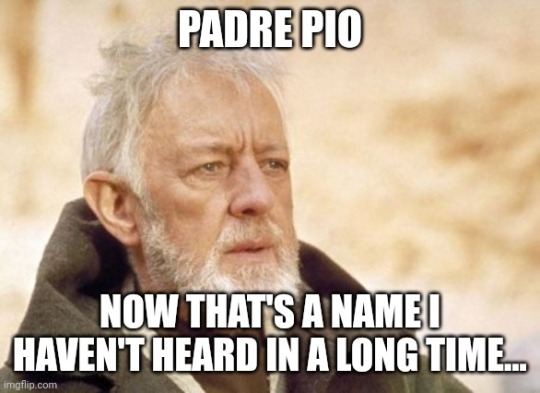
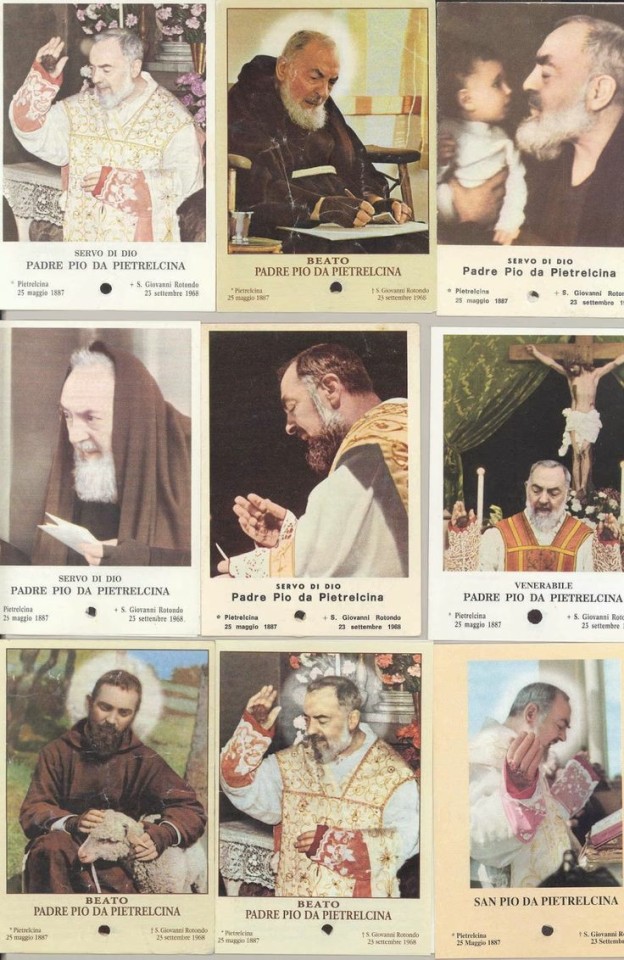
Padre Pio relic holy prayer cards
90 notes
·
View notes
Text
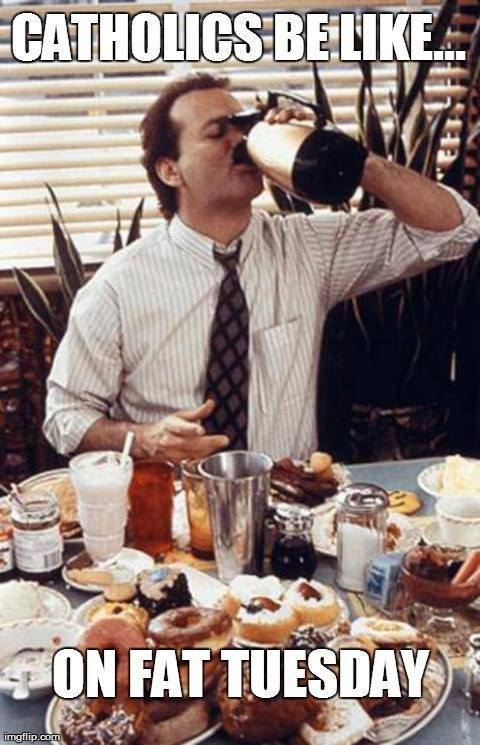
And this is how I learned the complicated history of Mardi Gras
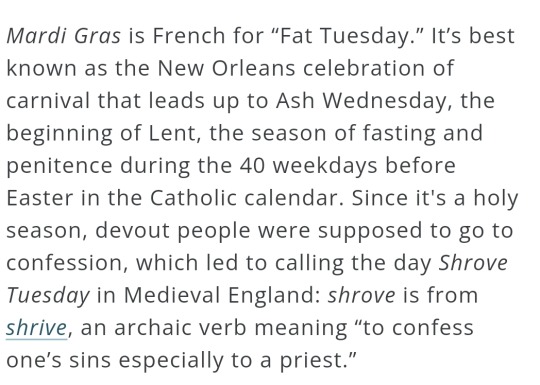
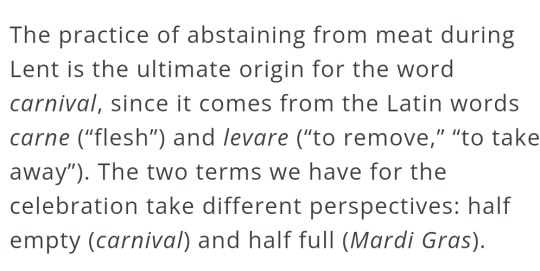
Huh
73 notes
·
View notes
Text
youtube
#christianity#catholicism#catholic#science#faith and science#documentary#faith#reason#language#evolutionarybiology#theology#word on fire institute#philosphy#Youtube
0 notes
Photo
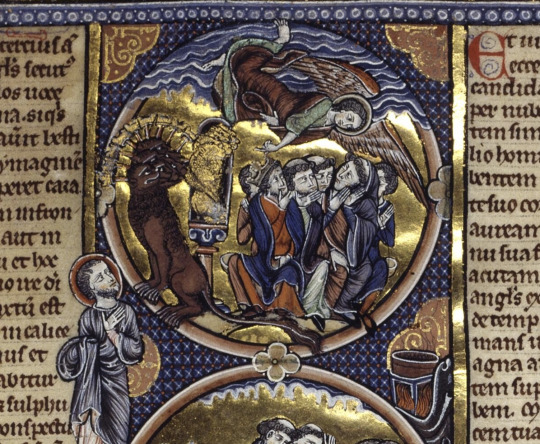
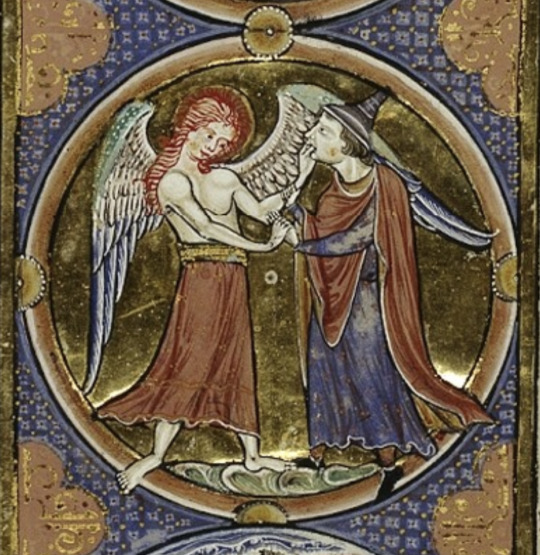


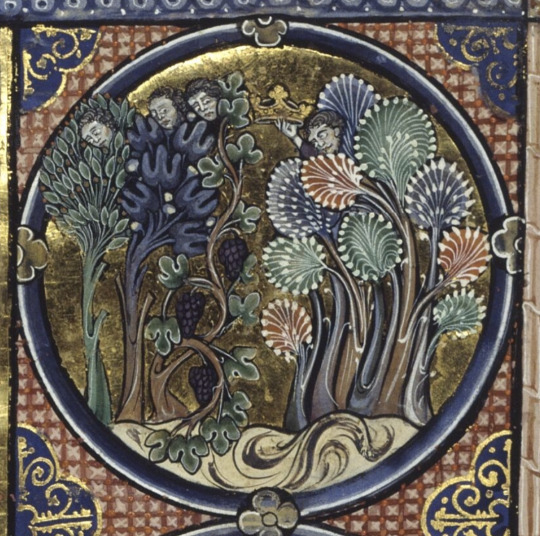

74 notes
·
View notes
Text
If you pray a different office, or a form of daily prayer instead (e.g. The Monastic Diurnal, The Little Office of the Blessed Virgin Mary, etc.) which one do you pray?
0 notes
Photo

Martyr on a circus ring, 1869, Fyodor Bronnikov
61 notes
·
View notes
Text
Pope Francis sends winter clothing, aid to earthquake victims in Turkey and Syria

Pope Francis has sent 10,000 thermal shirts to earthquake victims in Turkey and Syria, where millions are sleeping outdoors in below-freezing temperatures. As Justin McLellan reported for the Catholic News Service.
Two 7.8 and 7.5 magnitude earthquakes devastated the region Feb. 6, killing more than 40,000, according to figures released Feb. 15.
According to the Vatican, the winter clothing was personally transported to the port of Naples, some 115 miles south of Rome, by Cardinal Konrad Krajewski, the papal almoner, Feb. 14.
The shirts arrived in Turkey on Feb. 17 and delivered to the Kilis refugee camp in southern Turkey, which has hosted refugees fleeing the civil war in Syria since 2012 and currently holds some 60,000 people.
The Vatican said Francis also sent an undisclosed amount of financial aid to the apostolic nunciature in Syria to support the Syrian people “already exhausted by so many years of war and now by the devastating earthquake.”
Turkish Vice President Fuat Oktay said that over 1 million people in Turkey are living in temporary housing facilities, such as tents and shipping containers, as of Feb. 11. The UN refugee agency, UNHCR, estimated that as many as 5.3 million people could be left homeless in Syria as a result of the earthquakes.
(image from Pope Francis’ visit to Iraq in 2021 and shows the flag of Vatican City)
5 notes
·
View notes